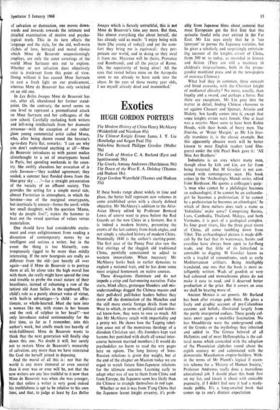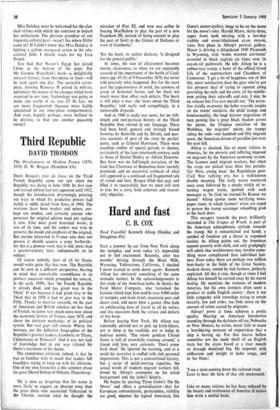Exotics
HUGH GORDON PORTEUS
The Chinese Knight Errant James J. Y. Liu (Routledge and Kegan Paul 35s) Indochina Bernard Philippe Groslier (Muller 70s) The Gods of Mexico C. A. Burland (Eyre and Spottiswoode 50s) The Greeks Antony Andrewes (Hutchinson 50s) The Dawn of the West E. A. Delahay (Thames and Hudson 18s) Egypt Gordon Waterfield (Thames and Hudson 35s) If these books range about widely in time and place, the better half represent new volumes in some established series with a clearly defined objective. Mr McAleavy's addition to the Afro- Asian library edited by Professor Bernard Lewis of course went to press before the Red Guards set the new China in a ferment. But it is indeed a modern history, presenting the events of the last century from fresh angles, and not simply a rehashed history of modern China. Nominally 1840 is the author's starting-point. The first year of the Penny Post also saw the first stirrings of the sluggish old traditional China, painfully constrained to adjust to western innovations. When necessary Mr McAleavy harks back to earlier dynasties to explain a national trait, and he has done some most original homework on native sources.
These divagations illuminate and do not impede a crisp and fast-moving narrative. False starts, blind alleys, grotesque blunders and mis- understandings dogged the Chinese masses and their pull-devil pull-baker leaders before they threw off the domination of the Manchus and the still more exotic foreign devils from that West to which, in terms of political and techni- cal know-how, they were to owe so much. All this Mr McAleavy retails with impartiality and a pretty wit. He shows how the Taiping rebel- lion arose out of the monstrous theology of a dissident Christian sect. (Its founders kept vast harems but punished with death all sexual inter- course between married members.) It would do psychedelics no harm to read the wry pages here on opium. The long history of Sino- Russian relations is given due weight, but at the end of the chapter on Maoism today we are urged to watch future Sino-Japanese relations for the ultimate outcome. Learning early to adapt what was of use to them from China and from Europe, the Japanese seem less likely than the Chinese to strangle themselves in red tape.
Whether or not it was from rang China that the Japanese learnt knight errantry, it's prob-
ably from Japanese films about samurai that most Europeans got the first hint that this quixotic feudal relic ever existed in the Far East. Mr Liu says coyly that he is 'too ignorant' to pursue the Japanese varieties, but he gives a scholarly and surprisingly entertain- ing account of the knights errant of China, from 300 BC to today, as recorded in history and fiction. (They are still a mainstay in children's strip-cartoons, both in the propa- gandist mainland press and in the newspapers of overseas Chinese.) What had they in common, these outcasts and hired assassins, with the Christian knight of mediaeval chivalry? No more, usually, than loyalty and a sword, and perhaps a horse. But there are exceptions. Mr Liu goes into the matter in detail, finding Chinese chansons to set against Chaucer and Spenser, Ariosto and Malory. Sex hardly comes into it, except that some knights errant were female. One at least was negrito. Most seem to have been Robin Hoods, with their bands of beery men. The Shui-hu, or 'Water Margin,' as Mr Liu liter- ally translates it, is the classic example. But this apparently obscure work will be better known" to most English readers (and film- goers) under the title Pearl Buck gave it: 'All Men Are Brothers.'
Indochina is an area where many men, though close by kith and kin, are far from being fraternal. But M Groslier is not Con- cerned. with contemporary man. His book comes ip the `Archeologia Mundi series, edited from Bordeaux. He quotes a colleague's quip: `a man who cannot be a philologist becomes an archaeologist; if he cannot be an archaeolo- gist he becomes a prehistorian; if he cannot be a prehistorian he becomes an ethnologist.' In which of these métiers does such a name as `Indochina' make sense? Comprising Burma, Laos, Cambodia, Thailand, Malaya, and both Vietnams, it is part of a geological complex.
Its four great rivers, like the three great rivers of China, all come tumbling down from Tibet. The archaeological picture is made diffi- cult by the fact that its waterways, basins and coastline have always been open to far-flung trade, and that little of its hinterland is amenable to digging. M Groslier leaves us with a trayful of conundrums, such as early Mediterranean artifacts. Being intelligibly translated, one sees that the book is most in- telligently written. Wads of goodish or very bad coloured and monochrome plates do not make it easy to read, and it deserved better production at the price. But it covers an area we shall be hearing more of.
Ancient Mexico is sui generis. Mr Borland has been after strange gods there. He gives a lively and graphic account of pre-Columbian customs and beliefs, illustrated largely from the partly interpreted codices. These gaudy cul- tures exert again a snakelike fascination. No less bloodthirsty were the underground chits of the Greeks or the mythology they inherited and added to. The Greece beloved of all Hellenists and of most Hellenophiles is the cul- tural nexus which coincided with the adoption of the Phoenician alphabet round about the eighth century ac and culminated with the democratic Macedonian empire-builders. With- in the terms of Mr Plumb's logical if eccen- tric scheme for a 'History of Human Society,' Professor Andrewes really does a marvellous educational job. I should place this book first on my list, and knock it about with amicable pugnacity, if I didn't feel sure it had a ready- made public. It's a long-awaited book that comes up to one's dizziest expectation. Miss Delahay must be welcomed for the'clai- sical virtues with which she contrives to impart her enthusiasm. The glorious grandeur of our linguistic-cultural past—wasn't this where Hitler came in? If I didn't know that Miss Delahay is fighting a gallant rearguard action in the edu- cational field, I should reach for my Ezra Pound.
Too bad that Nasser's Egypt has joined China at the bottom of the pops. But Mr Gordon Waterfield's book—a delightfully unusual history, from Herodotus to Suez—will be read again one day. The surrealist cover- plate, showing Rameses II poised in mid-air, epitomises the nature of the changes which have occurred in our time. Technology was going to make one world of us, was it? In fact, we are more fragmented (because more highly specialised in our time/place compartments). And even, happily perhaps, more inclined to be divisive, to find one another piquantly exotic?



































 Previous page
Previous page